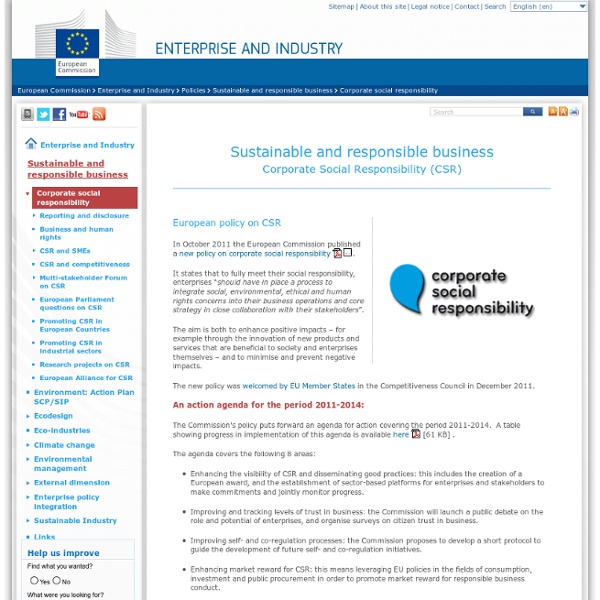Corporate social responsibility
The term "corporate social responsibility" became popular in the 1960s and has remained a term used indiscriminately by many to cover legal and moral responsibility more narrowly construed. Proponents argue that corporations increase long term profits by operating with a CSR perspective, while critics argue that CSR distracts from business' economic role. A 2000 study compared existing econometric studies of the relationship between social and financial performance, concluding that the contradictory results of previous studies reporting positive, negative, and neutral financial impact, were due to flawed empirical analysis and claimed when the study is properly specified, CSR has a neutral impact on financial outcomes.[5] Critics[6][7] questioned the "lofty" and sometimes "unrealistic expectations" in CSR.[8] or that CSR is merely window-dressing, or an attempt to pre-empt the role of governments as a watchdog over powerful multinational corporations. Definition[edit] Approaches[edit]
What is CSR?
RAPPORT sur la responsabilité sociale des entreprises: un nouveau partenariat - A6-0471/2006
sur la responsabilité sociale des entreprises: un nouveau partenariat Le Parlement européen, – vu les deux normes les mieux reconnues internationalement en matière de comportement des entreprises, à savoir la "déclaration de principes tripartite sur les entreprises multinationales et la politique sociale" de l'OIT et les "principes directeurs à l’intention des entreprises multinationales" de l'OCDE, ainsi que les codes de conduite convenus sous l'égide d'organisations internationales telles que la FAO, l'OMS et la Banque mondiale, et les efforts accomplis sous les auspices de la CNUCED en ce qui concerne les activités des entreprises dans les pays en développement, – vu la Convention de l'OCDE sur la lutte contre la corruption (1997), – vu la "Global Reporting Initiative" (GRI) lancée en 1997(1), et les lignes directrices mises à jour concernant l'élaboration de rapports sur le développement durable du G3, publiées le 5 octobre 2006, – vu l'article 45 de son règlement, Instruments de la RSE
Vision belge
Comment s’inscrire dans un mode de management toujours plus pratiqué en Europe ? De plus en plus d’entreprises de toutes tailles et de tous secteurs (privé, public, économie sociale,…) déploient des actions en matière de Responsabilité Sociétale des Entreprises (RSE), profitant ainsi au progrès global de la société. Grâce au site rse.wallonie.be, le Ministre de l’Economie, de l’Emploi et du Commerce extérieur de la Région wallonne permet aujourd’hui aux entreprises de mieux appréhender les avantages de ce concept et de s’y inscrire. Qu’est ce que la RSE ? La responsabilité sociétale des entreprises est un processus d’amélioration dans le cadre duquel les entreprises intègrent de manière volontaire, systématique et cohérente des considérations d’ordre social, environnemental et économique dans leur gestion en concertation avec leurs parties prenantes. Quelle plus-value pour les entreprises ? La RSE est avant tout une opération win-win pour les entreprises et pour la société.
ISO Social Responsibility
MAY 2011: ECOLOGIA's Handbook for Implementers of ISO 26000 ECOLOGIA has prepared this 33-page Handbook to meet the needs of small and medium sized businesses, who want to improve their impacts on their communities through developing their corporate social responsibility activities. In Summer 2011, ECOLOGIA will be working with a limited number of businesses in Vermont and in China, using the Handbook. The Handbook includes: overview of the standard and its goals, and what it can offer users workbook, featuring questions, tables to fill out, graphics, charts, real-life examples, and sections such as "Engaging Your Stakeholders: How to Begin the Process" definitions,principles and action suggestions for each of the seven core subjects: Organizational governance Human rights Labor practices Environment Fair operating practices Consumer issues Community involvement and development View the Handbook in .pdf format . NOVEMBER 1, 2010: Official "launch" of ISO 26000 in Geneva, Switzerland Dr.
bench-marks.org / home
ALISSE, accès en ligne aux statistiques structurelles d'entreprises
Vision belge
510 entreprises belges toutes régions, toutes tailles et tous secteurs confondus ont participé au baromètre 2011 de la Responsabilité Sociétale des Entreprises (RSE). Les conclusions sont sans ambiguïté. Le 14 septembre dernier, Business & Society Belgium et ses partenaires (Vlerick Leuven Gent Management School, Louvain School of Management et la FEB) présentaient les conclusions du Baromètre 2011 de la Responsabilité Sociétale des Entreprises (RSE) en Belgique. Les résultats du baromètre sont clairs: la responsabilité sociétale a gagné ses lettres de noblesse auprès des entreprises en Belgique. Et ces entreprises endossent leur responsabilité sociétale d’une manière de plus en plus structurée: Avec le baromètre 2011, les organisateurs n'ont pas seulement voulu réaliser une évaluation chiffrée de la réalité RSE dans les entreprises en Belgique. Pour découvrir plus en détails les résultats du baromètre 2011, cliquez ici Photo: copyright AGC Glass Europe



